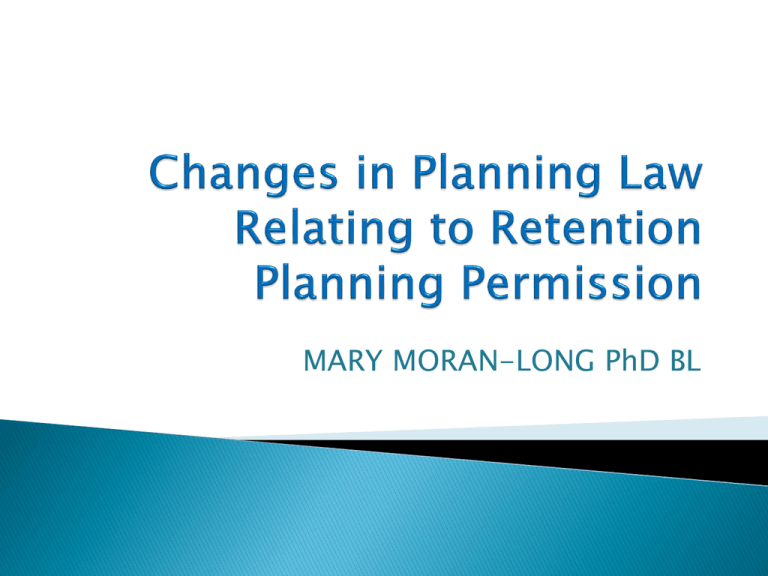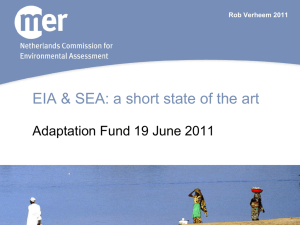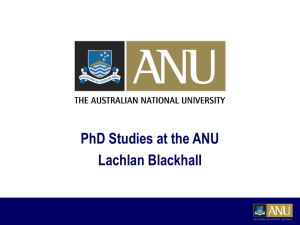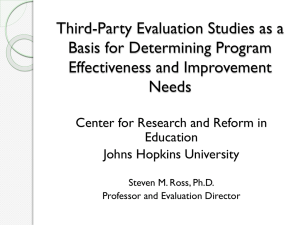Changes in Planning Law Relating to Retention Planning Permission
advertisement

MARY MORAN-LONG PhD BL Case C215/06 – Commission v Ireland (Derrybrian wind farm case) Ireland’s Planning Law allowed for unrestricted retention planning permission for any unauthorised development including that requiring an EIA/NIA ECJ held Ireland in breach of Arts 1 and 2 of EIA Directive Mary Moran-Long PhD BL Directive 85/337/EEC (as amended), ‘EIA Directive’ requires that an Environmental Impact Assessment, EIA procedure be carried out before ‘development consent’ or planning permission may be granted in respect of certain projects. Mary Moran-Long PhD BL Article 1(1) - Directive shall apply to the assessment of the environmental effects “of those public and private projects which are likely to have significant effects on the environment” Mary Moran-Long PhD BL Article 2(1) of the Directive emphasizes the requirement for prior assessment of such projects: “Member States shall adopt all measures necessary to ensure that, before consent is given, projects likely to have significant effects on the environment by virtue, inter alia, of their nature, size or location are made subject to a requirement for development consent and an assessment with regard to their effects.”(emphasis added) Mary Moran-Long PhD BL Annex I Projects likely to have significant effects on the environment - EIA is mandatory. Annex II Projects which might have significant effects on the environment, depending on the characteristics of the individual projectsAssessed as to whether EIA required. Mary Moran-Long PhD BL Transposes Annex I and II of EIA Directive Schedule 5 Part 1 - EIA mandatory (Annex I) Part 2 - projects that might have significant effects on the environment along with the thresholds for each. (Annex II) Require screening. Mary Moran-Long PhD BL Sub threshold development Articles 92 and 103 of the P&D Regs. 2001: Art. 92 - Development set out in Schedule 5 which does not exceed a particular threshold i.e. quantity, area or other limit specified in the Schedule, e.g. industrial estate of 15 Ha. Art 103 – If application for sub-threshold development received by planning authority without an EIS and it considers the development would be likely to have significant effects on the environment it must request in writing that the developer submits an EIS. Mary Moran-Long PhD BL Schedule 7 P&D Regs. 2001 – criteria to be followed by Planning Authority to decide whether a development is likely to have significant environmental effects. The criteria are categorised according to 1. Characteristics of proposed development; 2. Location of proposed development; and 3. Characteristics of potential impacts. Mary Moran-Long PhD BL ‘’An application for development of land in accordance with the permission regulations may be made for the retention of unauthorised development and this section shall apply to such an application, subject to any necessary modifications.’ = Unrestricted retention planning permission available for all developments including those requiring EIA Mary Moran-Long PhD BL Case 215/2006 Commission v Ireland (3 July 2008) (Derrybrian) European Court of Justice criticized the unrestricted availability of retention planning permission for developments that should have been subject to an EIA. The Court emphasized the requirement for prior assessment as set out in Article 2 of the EIA Directive. The Court went on to say that whereas European law cannot preclude the regularization of unlawful operations, this should occur only in exceptional circumstances. Mary Moran-Long PhD BL A planning authority shall refuse to consider an application to retain unauthorised development of land where the authority decides that if an application for permission had been made in respect of the development concerned before it was commenced the application would have required that one or more than one of the following was carried out: (a) an environmental impact assessment, (b) a determination as to whether an environmental impact assessment is required, or (c) an appropriate assessment. Mary Moran-Long PhD BL S34(12) as amended - A planning authority must now refuse to consider an application for retention planning permission for an EIA development Subsection (a) includes development for which EIA is mandatory (Annex I and Schedule 5 Part 1) Subsection (b) o Developments which are required to be screened as to whether an EIA is required (Annex II and Schedule 5 Part 2) o Sub-threshold developments (PA must assess using criteria in Schedule 7) o Extends to developments where if screened (before construction) would have led to the conclusion that an EIA was not required o Subsection (c) Assessments regarding Habitats Directive (Natura) NIA Mary Moran-Long PhD BL Enforcement S154 P&D Act 2000- RPP not a remedy for EIA unauthorised development, UD. Section 160 P&D Act 2000 - Planning Injunction Court can exercise discretion even where UD proved but swayed by public interest issue. Leen v Aer Rianta [2003] 4 IR 394 (pre dates the amendment) May a Court now use discretion not to grant reliefs where unauthorised development that required EIA/NIA is proved? – Would such a decision have the same effect as a grant of retention planning permission? Runs contrary to S34(12) as amended and Case C215/06 - would have effect of circumventing the purpose and objectives of the EIA Directive. BUT Not yet tested! Mary Moran-Long PhD BL Regularization of unlawful operations in exceptional circumstances – ECJ Case C215/06. Section 57 of the Planning and Development (Amendment) Act 2010 inserts a new Part XA, into the 2000 Act. Mary Moran-Long PhD BL An Board Pleanala only deals with leave to apply for substitute consent and substitute consent applications Applications for leave to apply with notice from planning authority Applications for leave to apply without notice from planning authority Leave granted – Apply for substitute consent No appeals process Oral hearing at discretion of Board Mary Moran-Long PhD BL With notice from planning authority o Permission was granted – found to be unlawful, invalid or defective in a material respect by final judgment of Court. o EIA/NIA was required for the development but was not provided or was inadequate. o Planning authority must issue notice to relevant person. o Notice must inform of judgment of Court; direct an application to Board for leave to apply for S C within 12 weeks of notice; EIS/NIS to accompany application and advise submissions/observations may be made within 4 weeks of notice. Mary Moran-Long PhD BL o o o o o o Whether submissions and observations made or not – planning authority must either confirm or withdraw the notice within 8 weeks of issue. Planning authority can only withdraw the notice where a court has found that the permission was not unlawful, invalid or defective. Planning authority must notify person of decision If notice confirmed planning authority must direct the person to apply to the Board for substitute consent within 12 weeks of the notification. A copy of the notice must be sent to the Board Details of the planning authority’s decision must be entered into the planning register. Mary Moran-Long PhD BL Without notice from planning authority A developer (or applicant on behalf of) can apply to the Board for leave to apply for SC regarding a development which required an EIA/NIA and o the person considers the permission granted to be unlawful, invalid or defective either pursuant to a judgment or because of matters contained or omitted from the application for PP or that an EIA/NIA was inadequate; - ORo due to any error of law, fact or procedure ; –ORo The applicant claims exceptional circumstances exist that would permit the Board to regularise the development by substitute consent o Apply to Board for leave to apply for substitute consent. o Mary Moran-Long PhD BL o o o Application must be accompanied by all relevant documentation the Board may request documents which must be provided within the specified time period – if not application deemed withdrawn Board may request documents from PA which must be provided within 6 weeks The Board can grant leave only where satisfied that the development required an EIA, permission was unlawful, invalid or defective in a material respect either by judgment or due to any matter contained or omitted in the application including omission of or inadequate EIA/NIA or through any error of law, fact or procedure OR In exceptional circumstances Mary Moran-Long PhD BL o o o o o o o In considering exceptional circumstances the Board must have regard for the following: Whether regularisation would circumvent the purpose and objectives of the EIA directive and Habitats Directive Whether the developer could have reasonably believed the development was not unauthorised Whether the ability to carry out an EIA/NIA was substantially impaired The actual or likely significant effects of the development The extent to which they may be remedied Whether the developer has complied with previous PP /other unauthorised development constructed by the developer (if any) Any other relevant information Mary Moran-Long PhD BL Board must make its decision within 6 weeks of the application/receiving further information or receiving information from PA Board must give reasons If leave granted must direct that application for substitute consent is submitted within 12 weeks accompanied by a remedial EIA/NIA Applicant may request an opinion of the Board regarding contents of the EIS/NIA Mary Moran-Long PhD BL Application to Board must: State name of applicant Include a remedial EIA or NIA or both Include the fee Comply with any relevant Regulations made by the Minister Submitted within 12 weeks of decision of Board to grant leave (Board has discretion to extend the time) Application not compliant - invalid Board may request further information Valid application - copy sent to PA – entered into planning register. Any person may make submissions/observations to the Board regarding the application Mary Moran-Long PhD BL Planning authority must provide a report to the Board with 10 weeks of a copy of the application being received The report must include: o Planning history of the development site o Any warning letters and enforcement notices served on the applicant o Relevant provisions of the Development Plan or LAP that affect the site o Any information regarding significant environmental impacts associated with the development and/or the site o Any remedial measures recommended or taken o The opinion of the County Manager as to whether substitute consent should be granted (with reasons) o Any conditions that should attach to a grant of substitute consent o Mary Moran-Long PhD BL o o o o o o While considering application Board may issue draft direction to cease activity etc. Board may refuse or grant consent with or without conditions Board must consider the factors set out in section 177K(2) of the P&D Act 2000 as amended in making its decision Board must notify the applicant of its decision giving reasons Board must also notify the planning authority and any person who made submissions or observations regarding the application No right of compensation in respect of circumstances set out under section 177K(6) of the Act Mary Moran-Long PhD BL o o Where Board refuses consent it may direct the applicant to undertake remedial works, restoration of lands etc. as set out in section 177L of the Act Offences for non compliance with directions of Board • • On summary charge up to €12,600 fine and/or 6 months imprisonment On indictment up to €12.6 million fine and/or 2 years imprisonment. Mary Moran-Long PhD BL THANK YOU FOR LISTENING








